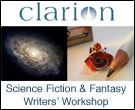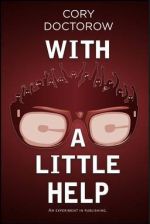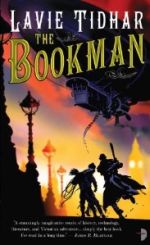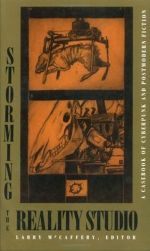Choosing The Best Possible Future: Thoughts on the Accessible Futures Contest at Its Close
I have entered several contests hosted by literary journals. I have never won any. I always order the journal and read the work that did, and I sometimes think, “Wow, I’m such a hack. I will never write anything as beautiful or thoughtful as this. I should stop trying.” On a few very rare occasions, I have thought, “Seriously? This piece of shit beat my own well-developed, compelling work? Are the editors idiots?” Most often, though, I think, “Well, this is also a very good piece—maybe better than my piece, maybe not, but I can see what the editors were looking for and why they chose it. I’m glad they did, so that I had the opportunity to read it.”
If you entered our Accessible Futures contest and you didn’t win, we’re hoping you have this last reaction. We had a very short of list pieces that went into the “no” pile, and a very, very long list that went into the “this has a lot of merit, let’s keep considering it” pile. Chances are good that your work was in that larger pile. That we liked it a lot, and that you might even have won if we hadn’t been so taken by the elegant handing of the contest’s theme in the work we did finally select. Don’t throw that story away; take another look at it, see if there are ways to polish it and bring it up another level, then send it off to someone else. We only had room for one piece, and there were many pieces submitted that deserve a readership.
Interestingly, the responses came in waves, and each wave had a preponderance of one sort of story over another.
Several of the earliest submissions appeared to be angry reactions to the idea that universal access is a common good. These stories painted a very dystopian picture of a world dumbed down, made silly, by the attempts to make shared space welcoming to people with exceptional bodies. They were reminiscent of Kurt Vonnegut’s “Harrison Bergeron,” and mistook universal access for an enforced uniformity of ability.
Disability advocates do not want to pluck Aleksandrs Antonenko from the Met’s upcoming production of Boris Godunov and replace him with a tone-deaf amateur. We may envision a performance of the opera done in American Sign Language, but as an addition to or comment on Mussorgsky’s original work, not a replacement for it. We are arguing primarily for the building itself to have ramps and seating space available for wheelchair users, assistive technologies for the deaf and hard of hearing, and other accommodations to allow persons of all embodiments to participate as audience members in the spectacle of the opera. (And, by the way, the Met is a fabulous example of universally accessible public space. They do an amazing job of making opera available to everyone.) We are fighting also for the right of a brilliant performer living with disabilities that do not impact the quality of his performance on stage—say, a baritone with low vision—to be given the opportunity to audition for the role. To not be excluded before having the chance to demonstrate his abilities as a performer. But we aren’t fighting to replace talent with mediocrity. We don’t want our hypothetical baritone cast if he isn’t positively the best person for the part.
Disability advocates do not envision a future of clumsy ballerinas and off-key divas.
After the first rush of stories, there was a lull of a little over a week when we received no new submissions. When the second wave of stories began to arrive, they also tended to deal with disability in a specific way: the second wave of submissions largely envisioned cures or assistive technologies which rendered the issue of universal accessibility of public space moot by undoing the need for it.
Disability advocates are rightfully suspicious of solutions to access which erase individual disability rather than remove common barriers. There are a number of reasons for this.
The iBOT serves as a fabulous cautionary tale for solutions that require individuals to acquire specific, expensive assistive technologies in order to fully participate in the community. One of Dean Kamen’s brilliant inventions, the iBOT is a wheelchair that allows the user to adjust his or her height to speak with people at eye level, will climb stairs (though not as reliably as the inventor no doubt originally hoped and, for most users, not without another person’s assistance), and function in terrain where no other wheelchair will work. It was the first product to use his gyroscopic balancing system that Kamen later deployed in the Segway. While it was not without its problems, almost everyone who saw or used one agreed that it was a very big step forward in wheelchair technology.
So why doesn’t the company make them any longer? Because, at almost thirty thousand dollars per unit, individuals could not afford them and insurance programs, for the most part, were unwilling to pay for them. (I’m not saying that they should have covered the expense, only that they didn’t. The complicated cost/benefits analysis for the iBOT over other chairs, frankly, is beyond me and there has been no great outcry from disability advocates to have this technology made available.)
Relying on individual solutions is, in the end, a much more expensive way to provide universal access than building accessibility into the design of shared space: iBOTs for every chair user would cost a lot more than adding ramps to all new construction.
Navigate: Page 1 Page 2
























3 comments
[…] Choosing The Best Possible Future: Thoughts on the Accessible Futures Contest at Its Close by Sarah […]
[…] incorporating the use of British Sign Language into a story of lunar isolation and solar radiation. Sarah’s essay on the contest provides some insight into the contest process and why Dr. Wood’s story embodied the […]
“Show me a good loser, and I’ll show you a loser.” – Stu Ungar
That’s always been my problem with writing competitions, both as admin and contestant.
“Wow, I’m such a hack. I will never write anything as beautiful or thoughtful as this. I should stop trying.”
I’ve never felt this way. Great writing inspires me. And frankly, I’m not sure if I believe you.
“Seriously? This piece of shit beat my own well-developed, compelling work?
Yeah, about 96 percent of the time. Someone should study what it is that binds writers so strongly to their own work. A whole “self-publishing” scam industry has sprung up to feed on this grand delusion, so I know it’s not just me.
“Well, this is also a very good piece—maybe better than my piece, maybe not, but I can see what the editors were looking for and why they chose it. I’m glad they did, so that I had the opportunity to read it.”
Maybe once or twice.
The problem with the theme for me was that I couldn’t get my head around a disability having no impact on a person’s goodness or badness, strengths or weaknesses, i.e. character. Like it was almost ironic or paradoxical to try to approach. Made me feel like I had to tippy-toe around my disabled character to stay “correct” (and as I feel was done with Wood’s scarcely developed and so marginal Mary of Yoda-esque grammar) and focus primarily on events and technology. Like if the theme had been to incorporate a character whose race or gender or sexual orientation or wealth or poverty or ugliness or beauty or even some super-human prowess or skill had no impact on their character, I’d have been equally flummoxed. And to create any character neither good nor bad (villainous or heroic) yet still somehow deep and interesting and relatable, as in one I cared at all about, also stymied me. The only way I could think of around this was to portray the character before and after the disability. I guess I’m confessing that I wound up working around and even against the theme, but which then as a sort of anti-theme managed to inspire. So thank you, Sarah.